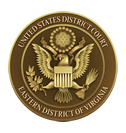1. Office hours: The courthouse building is open to the public from 8:00 a.m. to 5:00 p.m. The Clerk’s Office is open to the public from 8:30 a.m. to 5:00 p.m. Monday through Friday.
2. Try to have the case number when you call the Clerk’s Office with a case specific question. Knowing the case number allows the Clerk’s Office staff to answer your question more quickly and efficiently.
3. Attorney Civil Case Opening Procedures: Effective November 1, 2018, attorneys are required to electronically open civil cases and pay the appropriate filing fee via Pay.Gov. Please click here for more information.
4. Criminal cases filed before March 26, 2007 (paper cases) where a fugitive defendant is apprehended, that defendant's case will be converted to an electronic (e-filing) case no matter what the date the case originated. Thereafter, all documents pertaining to that defendant only must be electronically filed, with the exceptions noted in the policies and procedures manual.
5. Faxed documents are not accepted. Anything faxed to us will not become part of the file. If you are a pro se litigant, you must hand deliver or mail the original document to the clerk's office for filing.
6. Attorneys cannot sign for another attorney. You must sign your name and you must be admitted to practice in this Court. Additionally, in electronic cases, an attorney must be qualified to file electronically. (See CM/ECF section of this website for information on how to register for electronic filing). Once an attorney files a Notice of Attorney Appearance or pleading, they may add themselves as counsel of record.
7. Local counsel must sign and file all documents submitted by foreign counsel. Attorneys who are admitted pro hac vice may endorse pleadings. However, our Local Rules require the endorsement of local (admitted) counsel on all pleadings. The pro hac vice application form is required, as opposed to filing a separate motion.
8. Agreed orders. Agreed orders must contain the original signature of an admitted attorney for each party who has entered an appearance, and the Agreed/Consent Orders should be submitted to the Clerk's Office on paper with original signatures.
9. Entry of default and default judgment. Pursuant to Federal Rule 55(a), counsel must request entry of default, with a notarized affidavit in support of the default, prior to moving for default judgment.
10. Pending motions. All motions must be filed electronically before calling a judge’s chambers to schedule a hearing.
11. Documents under seal and personal identifiers. It is suggested that you review the Local Rules governing the filing of sealed pleadings (Local Rules 5 and 49) and the redaction of personal identifiers from filings (Local Rules 7 and 47), which set forth the responsibilities of counsel.
12. Do not file discovery documents. Discovery should not be filed in this Court. Pursuant to Federal Rule 5(d) and under the 16(b) scheduling order, disclosures should not be filed. Disclosures under 26(a)(1) and (2) are to be made among counsel only. Disclosures under 26(a)(3) are to be made among counsel and included as part of the final pretrial conference.
13. Trial exhibits. It is requested that trial exhibits be bound and tabbed for easy access. If you plan to refer to certain pages in a multiple page document, please number each page for quick reference. A digital evidence presentation system is available in our courtrooms which can display exhibits on monitors, play videos, and permit illustrations directly on the screen. Jury copies of exhibits are not necessary when this system is used.
14. Juror information may be obtained three days prior to trial. A list of jurors assigned to a particular case may be obtained three days prior to the trial of that case. The list includes jurors’ names, city, zip code, date of birth, gender, race, occupation, employer, marital status, number of children and spouse’s occupation.
15. Files in paper cases are usually not available immediately before or during hearings or trials. Our judges and their staff need case files prior to and during hearings and trials. If you need to review a file, please visit the courthouse to request the file a few days ahead of time. Electronic cases may be accessed through PACER.
16. Security reminder. Please visit the Richmond Division page and review the Important Security Information regarding access to the courthouse, devices allowed, and how attorneys may obtain approval to bring laptops into a courtroom.
17. We cannot answer legal questions or interpret rules and orders. Our staff receives training as to what constitutes a legal, as opposed to a procedural question. We are prohibited from interpreting the Federal Rules, Local Rules, and judge’s rulings for counsel or their staff. We may refer someone to a particular rule, but the attorney or assistant must make his or her own interpretation.
18. Attorneys are encouraged to review the Code of Pretrial and Trial Conduct.
